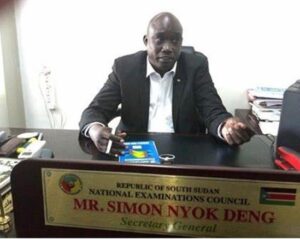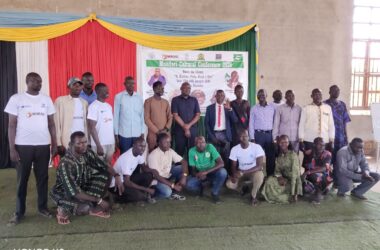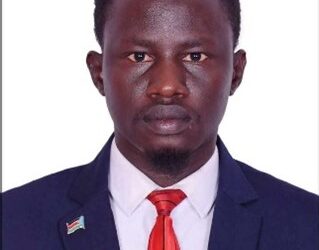
By Alan Clement
Parents and educators alike have expressed concerns over the new examination funding strategy announced by the National Examination Council on Wednesday August 20th, 2025.
The National Examination Council announced a new funding strategy that will see parents pay additional fees for primary and secondary school certificate exams starting next year during the release of the long-awaited Certificate of Secondary Education results.
Simon Nyok, Secretary General of the Council, said the measure is intended to speed up the release of examination results. Under the plan, candidates in government schools will pay 80,000 South Sudanese Pounds (SSP), while those in private schools will be charged 120,000 SSP.
“This amount of money that will be collected from the candidate will form the foundation of the budget of the National Examination Council,” Nyok explained, noting that the fees are expected to cover nearly half of the projected cost for the 2025 exams.
However, the announcement has drawn criticisms from parents and teachers who argue the fees are excessive and inequitable, especially amid the ongoing economic hardship.
“While the intention may be good, that money is too much,” said Edith Poni, a parent of a Primary Eight candidate in a private school. “I cannot afford to pay additional money while I have already paid fees at the school. They should have included it in some requirements but not directly like this” she added.
Samuel Majok, a parent and the deputy headteacher at Smooth Star Academy, said the fees would burden families especially those with multiple candidate children. “If you have maybe five children, paying 120,000 per each is really tedious. Moreover, you also have other responsibilities like medication, feeding, and dressing,” he noted.
Majok further argued that private school parents are already stretched by high tuition and additional costs such as exam center fees charged on learners to cover teachers’ allowances during exams. “So, to my own way of analyzing this, I think it is not actually necessary to pay an amount of 120,000 pounds,” he said.
Alfred Aleu, PR and Communication Officer for Teachers Without Borders, on the other hand questioned the fairness of the new funding strategy arguing that the fees charged are for the same examination. “They are all equal. They are not getting different education, so why should the private school be charged higher? A right decision should be equal, 80–80. That could be fair,” Aleu said.
He also raised concerns about the government’s existing education budget, suggesting the new fees may reflect deeper issues in public financial management and seemingly calling for greater transparency and consultation in education financing. “There is always a budget allocated to examinations and the Ministry of Education. If the marking is delayed, where is that money going?” he said. “The students’ fees should not be the foundation of the budget.”
The announcement has fueled debate on whether the government is shifting its responsibilities onto already struggling families amid the country’s economic crisis and in total contravention of the presidential order for free education issued in January 2023.
“All levels of government should ensure that free education policy is adhered to as provided by the law, including free registration of pupils and students,” read the presidential order. In March 2023, then Education Minister, Awut Deng Acuil warned public schools against violating the president’s free education policy.
“You are there representing the council and you should follow the rules and regulations of the council. We pay for certificate, we pay for the examination, we pay for transportation, I don’t know why our students are charged,” said Awut while directing examination secretaries in the States and Administrative Areas to obey the presidential order and ensure unhindered access to all.




